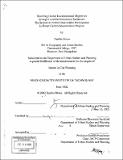Realizing global environmental objectives through local environmental initiatives : the incentives behind stakeholder participation in forest carbon sequestration projects
Author(s)
Bruso, Xantha (Xantha Seraphina), 1975-
DownloadFull printable version (12.09Mb)
Other Contributors
Massachusetts Institute of Technology. Dept. of Urban Studies and Planning.
Advisor
Lawrence Susskind.
Terms of use
Metadata
Show full item recordAbstract
Since the early 1990s, dozens of projects have been established and millions of dollars have been invested in jointly-implemented forest carbon sequestration projects in both Annex Band non- Annex B countries. This prompts the question of why, without mandatory emission reduction requirements or promise of any return on their investment in emission reduction credits, governments, companies, and individuals have invested in projects to reduce their greenhouse gas emissions. To explore this question, I investigated the incentives behind stakeholder participation in three voluntary carbon sequestration projects: the Rio Bravo Carbon Sequestration Pilot Project in Belize, the Klinki Forestry Project in Costa Rica, and the Profafor/F ACE Forestry Project in Ecuador. Based on a site visit to Belize and telephone interviews with stakeholders in Costa Rica and Ecuador, I determined that stakeholders participated in these projects because of both the potential international market in emissions reduction credits and the more immediate and local economic, social, and environmental benefits of the projects. Despite the numerous incentives to participate in forest carbon sequestration projects, there are still many inherent uncertainties in both the process and the politics of carbon sequestration. A number of general uncertainties regarding project design, international policy, the market in carbon offset credits, and host country capacity still need to be addressed in order to lower transaction costs and advance the development of forest carbon sequestration projects. The primary principle that I have determined from my research is that in order for jointly implemented forest carbon sequestration projects to be successful, the benefits that a landowner receives, either indirectly through environmental benefits such as reduced erosion or watershed protection, or directly through income from the project or from timber sales, need to continuously equal or exceed the opportunity cost of land on which the forest is planted throughout the project life. The fundamental challenge of carbon sequestration projects is to create a dynamic system that gives adequate long-term returns and flexibility to landowners while maintaining a certain level of carbon sequestration and security for investors.
Description
Thesis (M.C.P.)--Massachusetts Institute of Technology, Dept. of Urban Studies and Planning, 2002. Includes bibliographical references (p. 88-92).
Date issued
2002Department
Massachusetts Institute of Technology. Department of Urban Studies and PlanningPublisher
Massachusetts Institute of Technology
Keywords
Urban Studies and Planning.